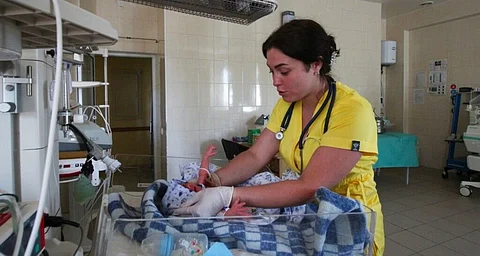

The global health agency Unitaid says a device it has provided for use in hospitals in war-torn Ukraine is saving the lives of many premature babies.
It is difficult to get an accurate count of the number of prematurely-born babies who have died since Russia invaded Ukraine on February 24. Many hospitals have been damaged or destroyed, and supply chains broken, putting thousands of newborns at high risk of disability or death from lack of oxygen and other essential treatment.
Unitaid says some hospitals report premature deaths have risen from 12 percent before the war to 40 percent now, making its breathing device more important than ever.
Unitaid spokesman Herve Verhoosel says Unitaid, through its partner, Vayu Global Health, has provided 220 bubble nasal devices and 125 oxygen blender systems. This system, he says, supplies at-risk premature babies with the breathing support and oxygen they need to survive.
He says the bubble CPAP device, as it is called, is a non-invasive way of ventilating newborns who are struggling to breathe. He notes the oxygen blenders give babies the pure oxygen they need to prevent eye, lung, and brain damage.
"This device is very cheap. Less than 500 U.S. dollars at the end of the day for the device itself, to produce the device," Verhoosel said. "I do not speak about the research and development cost that we have put into this. It is easy to use, working for three years, without electricity. Very cheap, efficient, simple to use device."
The bubble nasal devices are available in 25 facilities across Ukraine, of which 17 are perinatal centers. World Health Organization spokeswoman Margaret Harris says it is crucial to have a portable device, which can function off-line in a war setting.
"One of the critical things is having something like this that can function when you have got no electricity, for instance. Because, as you know, we have now had — it was verified — 434 attacks on hospitals. And every time there is an attack, one of the things that happens is the electricity does not work," Harris said.
The device was granted Emergency Use Authorization by the U.S. Food and Drug Administration to help in the fight against COVID-19. Unitaid says the devices can be used worldwide but are particularly well-suited in humanitarian crises or in poorer countries.
The system, which has proven to be effective in saving the lives of premature babies, is currently being used in several African countries as well as Belgium and the United States. (SP/VOA)
